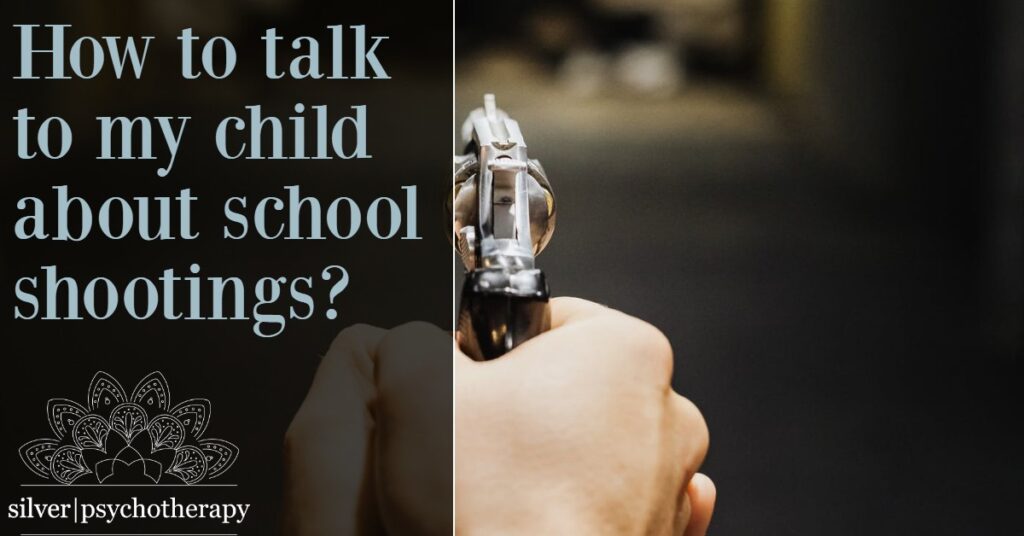In the wake of a tragedy like Sandy Hook, and now Uvalde, we hold our children a little tighter and worry for their safety. We are the lucky ones that can still hold them, kiss them, and inhale their smell. And then we are faced with the question, “what should I tell them?”. In order to allow the children in our lives to process, we must first do that ourselves-talk with partners, and friends, journal and make sure to give ourselves some space for self-care.
As with most things, this is not clear-cut. As their provider, you know your child best and there are some thoughts to take into consideration such as the developmental age and prior history of your child. Here are some guidelines to help you navigate:
1) Say nothing- Younger children (under 10) do not need to watch the footage on the news or hear you discussing it with other adults. They go to school and feel safe. Trust the school to provide the child with “practice” drills to stay safe and be prepared to listen to any fears they may bring home. It is important to not make promises that we cannot keep, so promising safety is something to avoid.
- Reinforce safety in other ways: Ask your child, “How do we protect ourselves when we ride a bike?”- We wear a helmet and look before crossing.
- “How does the school protect us?”- We do practice drills they keep the doors locked.
- The concept of good vs evil is also something that children in this age group can understand. Strengthening your child’s capacity to trust their gut is something that is extremely important. and we can do this in the following ways: Don’t be so quick to jump in and fix things for them, which means they need to learn to problem solve and to trust their gut. You can also use stories and ask them questions- “What would you have done here? What do you think that character was feeling? When do you think she knew that something wasn’t ok? How did she know something wasn’t ok in this story”.
2) Say something- 10 and under – If you feel your child is particularly anxious, concerned, has a history of trauma or has asked you questions, it may be appropriate to talk with them. Using clear and simple language can be helpful to provide information to avoid storytelling or adding information that may not be needed.
- Listen to their concerns, and gently correct any misinformation.
- Use your current community support- call upon family, friends, and neighbors to spend time with to strengthen your family’s support network.
- Maintaining your child’s regular structure and routine can continue to provide a level of comfort and security.
- Continue to monitor media use as they may be exposed unnecessarily to articles, images, or social media.
3) Say something- children 10 and up. Have a discussion on ways that the school adds layers of protection and ways that your child can protect themselves. Children at this age love to hear the Who, What, When, and Why’s. They Google everything, so it is important that you give them facts and introduce them to political activism to channel some of their thoughts and fears. Sit down with them and do searches together to find some of the answers to their questions.
Lastly, to answer the question, “Why would someone want to shoot up a school?”
We as parents don’t have all of the answers. Ask their thoughts first before offering your own opinion. Introducing the gray area of life is extremely important at this age. Things are not always literal (black and white) and this is a hard concept for many youth.
- Introducing concepts of radical groups and allowing it to generate a wealth of great discussions.
- Introducing the concepts of mental health and when to speak up if they see someone struggling with mental health issues- Do you see someone who looks sad or uncomfortable most of the time? Are there classmates that have cried or are isolated from other kids? Do you see bullying happen in school or online? Know your local & national resources and mention them- this demystifies mental health and those resources may pop back into their head when they need it most.
Although we may feel anxious during these difficult times, if we as caregivers appear anxious, children will pick up on it. Remember to channel your own fears and anxiety toward getting involved in policy change or advocacy. Allowing for children to see an empowered caregiver creates empowered children!

